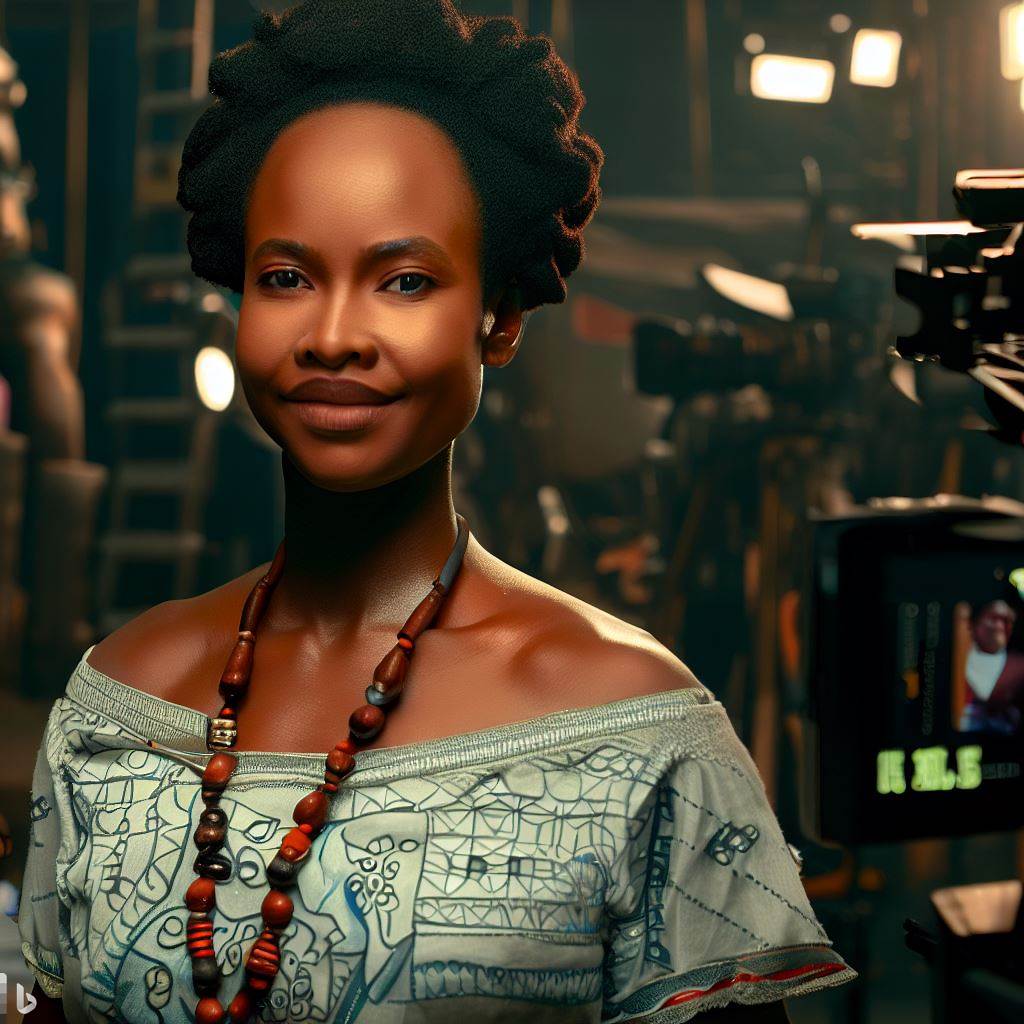Introduction
Foley artists play a crucial role in film and television, adding sounds to enhance the viewing experience.
Their work involves creating or reproducing sounds that cannot be captured during filming, such as footsteps, rustling clothes, or breaking glass.
Foley artists bring movies and shows to life by immersing viewers in realistic audio environments. In recent years, the Nigerian film industry, also known as Nollywood, has experienced significant growth.
Nollywood has become the second-largest film industry globally, surpassing Hollywood in terms of movie production. With this growth, the demand for Foley artists in Nigeria has also increased.
Nigerian Foley artists face unique challenges due to budget constraints, lack of proper equipment, limited training opportunities, and the absence of recognition for their contributions.
Despite these hurdles, Nigerian Foley artists continue to play a vital role in enhancing the sound quality of Nollywood productions.
In this blog post, we will discuss the challenges faced by Nigerian Foley artists and explore potential solutions to overcome these obstacles.
Through this exploration, we aim to shed light on the critical role of Foley artists in the Nigerian film industry and the need for their recognition and support.
By understanding the challenges they face and finding solutions, we can help foster a thriving environment for Foley artists in Nigeria.
Read: Essential Tools for a Foley Artist: Nigerian Perspective
Challenges Faced by Nigerian Foley Artists
A. Limited resources and equipment
Nigerian Foley artists face numerous challenges that hinder the development and growth of their craft. One significant hurdle is the limited resources and equipment available to them.
These artists often lack access to high-quality recording equipment and props, making it difficult to produce professional-level sound effects.
Additionally, there is an insufficient amount of funding allocated to Foley studios and sound effects libraries, further restricting the resources available to Nigerian Foley artists.
B. Inadequate training and technical knowledge
Another challenge is the inadequate training and technical knowledge within the Nigerian Foley community.
Formal education and training programs for Foley art are scarce, leaving aspiring artists with limited opportunities to learn and develop their skills.
This scarcity of training programs contributes to a limited understanding of advanced sound editing techniques, hindering Nigerian Foley artists’ ability to create innovative and high-quality sound effects.
C. Cultural constraints and limited recognition
Cultural constraints and the limited recognition of Foley work also pose challenges for Nigerian Foley artists.
In the Nigerian entertainment industry, there is a perception that Foley work is a less prestigious job compared to other roles.
This cultural bias diminishes the status and value attributed to Foley artists, making it harder for them to gain respect and recognition for their contributions.
Furthermore, the lack of recognition and awards for Foley artists further exacerbates their struggle to be acknowledged and appreciated for their craftsmanship.
In the end, Nigerian Foley artists face significant challenges, including limited resources and equipment, inadequate training and technical knowledge, and cultural constraints.
These obstacles hinder their ability to produce high-quality sound effects and gain recognition for their contributions.
To address these challenges, it is crucial to invest in the development of Foley studios, provide funding for sound effects libraries, establish formal education and training programs, and promote a greater appreciation for the artistry of Foley work in the Nigerian entertainment industry.
By doing so, Nigerian Foley artists can overcome these challenges and thrive in their craft.
Read: Creating Authentic Sounds: Tips from Top Nigerian Foley Artists
You Might Also Like: Case Studies of Influential Artists’ Agents in Nigeria
Solutions to Overcome Challenges
Foley artists in Nigeria face various challenges in their profession, but there are solutions available to overcome these difficulties.
A. Collaboration and resource-sharing
To tackle the limitations they encounter, Foley artists can create networks and communities for support and knowledge exchange.
By working together, they can share their experiences, techniques, and challenges, finding collective solutions to improve their craft.
Additionally, they can share equipment and resources to overcome limitations such as limited access to specialized tools or costly equipment.
By pooling their resources, Foley artists can enhance their capabilities and produce high-quality sound effects.
B. Advocacy for education and training opportunities
Foley artists can advocate for the inclusion of Foley art in film and media-related courses.
By pushing for its inclusion, they can ensure that aspiring filmmakers and sound professionals receive proper education and training in Foley techniques.
This advocacy can also encourage institutions to offer specialized training programs dedicated to Foley art.
These programs would equip individuals with the necessary skills and knowledge to excel in the field, addressing the shortage of trained Foley artists in Nigeria.
C. Promoting the importance of Foley art in Nigerian films
Educating the public and industry stakeholders about the role and creative input of Foley artists is crucial.
Foley artists bring life and authenticity to on-screen actions through their sound effects, enhancing the overall cinematic experience.
By highlighting their contributions, Foley artists can raise awareness about the importance of their craft and garner recognition for their creative endeavors.
Creating platforms, such as film festivals or showcases, specifically dedicated to showcasing the work of Nigerian Foley artists can further amplify their impact and encourage collaboration within the industry.
Nigerian Foley artists conquer challenges through collaboration, sharing resources, advocating education, and highlighting art’s significance in local films.
By implementing these solutions, the Nigerian Foley industry can thrive, ensuring the production of high-quality sound effects and supporting the growth of the country’s film industry.
Read: Training Opportunities for Aspiring Foley Artists in Nigeria

Success Stories and Achievements
A. Notable Nigerian Foley artists and their work
Successful projects where Foley artists played a significant role
Nigeria has witnessed incredible success stories in the field of Foley art, showcasing the immense talent of its artists.
One such project is the critically acclaimed film “The Milkmaid,” directed by Desmond Ovbiagele.
Foley artists played a significant role in enhancing the film’s audio experience, adding depth and realism to the visuals.
Additionally, the movie “The Lost Okoroshi,” directed by Abba Makama, stands out for its innovative use of Foley art.
The artists skillfully recreated various sounds, allowing viewers to immerse themselves fully in the narrative. Their efforts contributed to the film’s success and helped create an authentic cinematic experience.
Internationally recognized Nigerian Foley artists and their achievements
Nigerian Foley artists have also gained recognition on the international stage, further cementing their influence in the industry.
One such artist is Bode Ojo, whose work on the critically acclaimed film “The Burial of Kojo” received widespread acclaim.
Ojo’s ability to create compelling soundscapes earned him a nomination for Best Sound Design at the Africa Movie Academy Awards.
Another remarkable talent is Tife Kusoro, who has made a name for herself as a Foley artist in the United States.
Her exceptional skills have earned her various accolades, including a nomination for the Motion Picture Sound Editors Golden Reel Awards.
Kusoro’s achievements serve as an inspiration to aspiring Foley artists in Nigeria and highlight the immense potential present in the country.
B. Recognition within the industry
Instances where Nigerian Foley artists received recognition and awards
Nigerian Foley artists have been receiving well-deserved recognition for their outstanding contributions to the industry.
The film “The Delivery Boy,” directed by Adekunle “Nodash” Adejuyigbe, garnered international acclaim for its exceptional sound design, largely attributed to the work of Foley artists.
This recognition speaks volumes about the growing appreciation for their artistry.
Moreover, at the Africa Movie Academy Awards, Foley artists like Solomon Emekwe were celebrated for their remarkable skills and dedication.
Emekwe’s work on the film “Kasala!” earned him the award for Best Sound Design, further solidifying the importance of Foley art in Nigerian cinema.
The increased appreciation and demand for Foley art in Nigerian films
In recent years, the demand for Foley art in Nigerian films has been on the rise. Filmmakers and audiences alike recognize the valuable contribution that Foley artists make in elevating the overall audio experience.
This increased appreciation has led to more opportunities for Nigerian Foley artists to showcase their talents and influence the storytelling process.
The success of films like “King of Boys” and “Chief Daddy” can be attributed, in part, to the meticulous sound design created by skilled Foley artists.
Nigerian films’ seamless sound recreation propels them to global acclaim, as they compete and garner recognition on international stages.
In review, Nigerian Foley artists have made significant strides in the industry, leaving a lasting impact on the films they have worked on.
These artists exhibited Foley art’s potential in Nigerian cinema through successful projects and notable achievements, highlighting their talent.
Their industry recognition showcases growing Nigerian appreciation, propelling Foley art’s promising future and contributions’ acknowledgment.
Read: Foley in Nigeria: Exploring the Demand in Local Film Industry
Conclusion
Nigerian Foley artists face numerous challenges in their industry. These include limited resources, lack of recognition, and a small market for their work.
Addressing these challenges is crucial for the growth and development of the industry.
It is essential to emphasize the importance of addressing these challenges. By doing so, we can create a conducive environment for Nigerian Foley artists to thrive and contribute to the entertainment industry.
Aspiring Foley artists should not be discouraged by these challenges. Instead, they should be encouraged to pursue their passion and develop their skills.
Continued support and recognition from the industry and the wider public are vital to fostering a vibrant Foley art community in Nigeria.
Overall, Nigerian Foley artists play a significant role in enhancing the audiovisual experience in film and television.
It is essential to recognize their contributions and provide the necessary support and infrastructure to overcome the challenges they face.
With the right resources and opportunities, Nigerian Foley artists have the potential to make a lasting impact on the entertainment industry.




